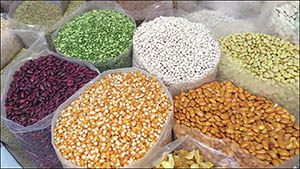Beans and grains are great sources of fiber. Consuming more fiber on a daily basis is proven to help with weight loss, heart disease, and some types of cancer.
By Alison Crane
Maintaining good health requires effort and consistency and sometimes can feel like an uphill battle. But if you think about it as making one good choice at a time, it is not such an overwhelming task. One simple way to start improving your health is to make sure you are getting enough fiber in your diet.
Most U.S. adults only get about half of the fiber recommended for good health. What makes this statistic so surprising is that making sure your diet has enough fiber is fairly simple. Dietary fibers are carbohydrates found in all plant-based foods. Fiber is what is left after our body digests the proteins, fats, sugars, and starches from plant foods. These foods include grains, fruits, vegetables, legumes, seeds, and nuts.
Dietary fiber comes in two types: soluble and insoluble. Both have an important role in your digestive system. Soluble fiber dissolves to form a gel-like substance that actually helps prevent your body from absorbing as much fat and cholesterol from other foods. Insoluble fiber helps move the food through your system and is often referred to as “roughage.”
Most people associate fiber with helping to keep the bowels regular, but it actually does that and so much more. Consuming more fiber on a daily basis is proven to help with weight loss, lowering the risk of diabetes, heart disease, and some types of cancer. This is partly because fiber helps move the food through your digestive system and out. High-fiber foods also help with satiety, so you feel full longer. The foods that are high in fiber likewise provide many of the other nutrients needed, helping to maintain a balanced diet.
The Institute of Medicine recommends that men intake 30 to 38 grams of fiber daily depending on their age. Women need 21 to 25 grams of fiber daily. The best sources of fiber are from foods. High-fiber foods provide a variety of fibers and other minerals, vitamins, and nutrients, but there are fiber supplements available in pill and mixable powder forms. Before taking fiber supplements be sure to consult your physician.
Try these tips to start making some simple choices that will help you add more fiber to your diet without a lot of fuss. When baking, bulk up your baked goods by using whole-grain flour or even half white flour and half whole-grain. Include beans, peas, and lentils in your salads, soups, or even snacks. Choose breads that have “whole wheat,” “whole-wheat flour,” or another type of whole grain as the first ingredient on the label. If your breakfast cereal is not high in fiber, sprinkle some chia seeds or unprocessed wheat bran over it.
You can contact the Garland County Extension Service for more information or programs on making good health choices. Call 501-623-6841 or email acrane@uada.edu. You can also visit our website at www.uaex.uada.edu.
Alison Crane is a Family and Consumer Sciences Agent with the Garland County Extension Service. The University of Arkansas System Division of Agriculture offers all its Extension and Research programs to all eligible persons without regard to race, color, sex, gender identity, sexual orientation, national origin, religion, age, disability, marital or veteran status, genetic information, or any other legally protected status, and is an Affirmative Action/Equal Opportunity Employer.









